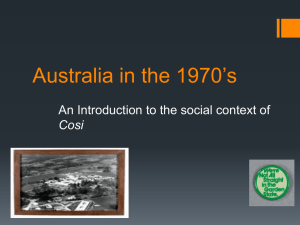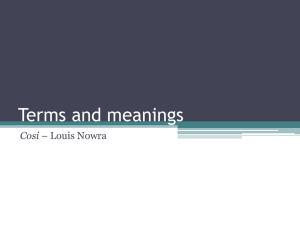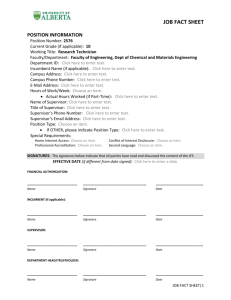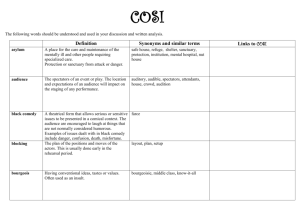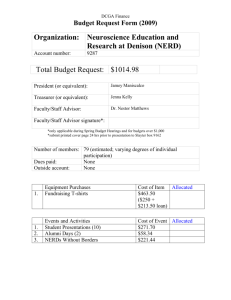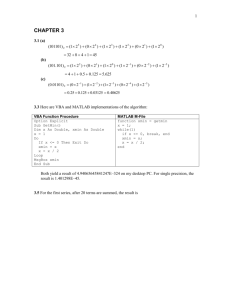a major in communication sciences
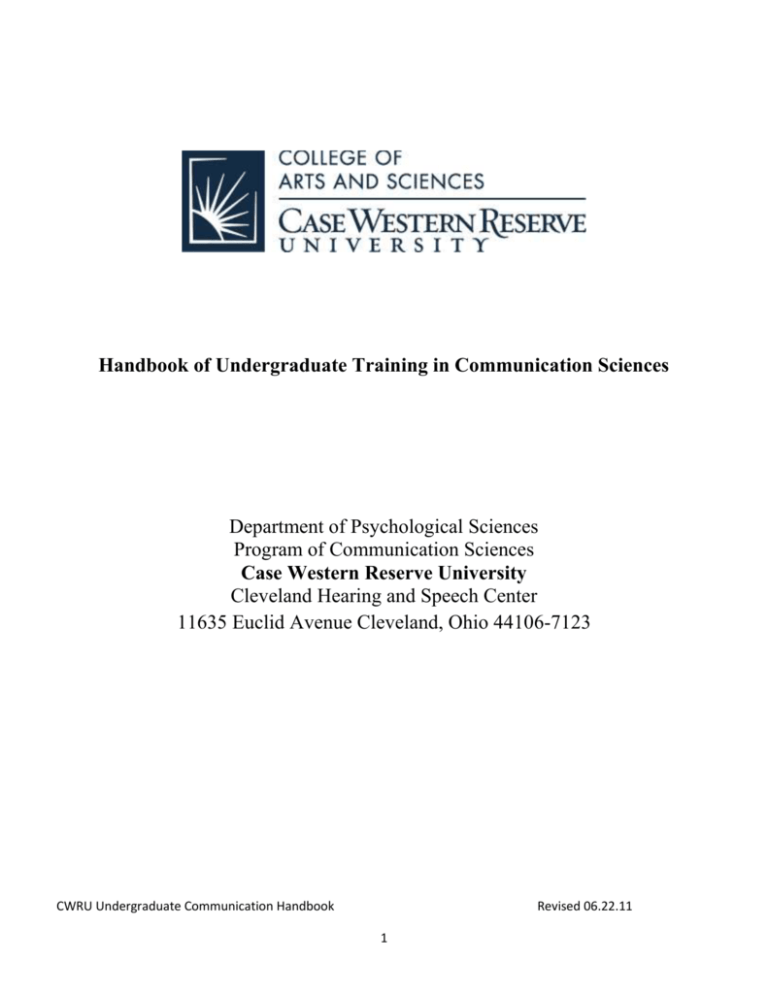
Handbook of Undergraduate Training in Communication Sciences
Department of Psychological Sciences Program of Communication Sciences
Case Western Reserve University
Cleveland Hearing and Speech Center 11635 Euclid Avenue Cleveland, Ohio 44106-7123
CWRU Undergraduate Communication Handbook 1 Revised 06.22.11
Undergraduate Communication Sciences Handbook Table of Contents
A. General Information------------------------------------------------------------- Page 3 B. Courses Offered by the Department of Psychological Sciences----------- Page 5 C. Requirements for the Communication Sciences Major--------------------- Page 13 D. Requirements for the Communication Sciences Minor--------------------- Page 14 E. Requirements for the Health Communication Minor------------------------ Page 14 F. Special Programs for Communication Science Students-------------------- Page 15 1. Honors Program 2. Integrated Graduate Studies Program G. Advising within the Department of Psychological Sciences -------------- Page 18 H. Resources for Students---------------------------------------------------------- Page 18 I. Printable Forms ------------------------------------------------------------------- Page 19 1. List of CWRU College of Arts and Sciences Requirements 2. List of CWRU Communication Sciences Major Requirements 3. List of CWRU Communication Sciences Minor Requirements 4. List of CWRU Health Communications Minor Requirements CWRU Undergraduate Communication Handbook 2 Revised 06.22.11
WHY STUDY COMMUNICATION SCIENCES?
Typically, students who complete an undergraduate degree in communication sciences pursue graduate education in speech-language pathology or audiology. A master’s degree is the entry level degree for professional clinical practice in speech-language pathology. A clinical doctorate in audiology (AuD) is the entry level professional degree in audiology. Thus, for many students an undergraduate degree in communication sciences is a pre-professional degree in preparation for graduate study. As such, the undergraduate coursework in the communication sciences curriculum emphasizes the basic processes and acquisition of normal communication in children and adults. Graduate study then focuses on the study of disordered communication. Many students pursue undergraduate study in communication sciences as preparation for further study in other fields or in conjunction with study in other fields. For example, one can combine a major in communication sciences with a major in sociology or psychology or with a minor in gerontological studies. Those professionals involved in human services fields such as medicine, social work, nursing or education work with persons with communication disorders. For students interested in academic or research careers, investigation in the field of communication sciences is often done alongside investigation of normal human behavior. For example, one might study the word learning of children with normal language as well as children with language impairments.
CAREERS IN COMMUNICATION SCIENCES
The American Speech-Language-Hearing Association (ASHA) is the national professional organization for speech-language pathologists and audiologists. Speech-language pathologists and audiologists are professionals who provide assessment and intervention services to persons with communication disorders. They are employed in a variety of settings including hospitals, nursing homes, schools, and private practice. ASHA issues a professional certification in the fields, the Certificate of Clinical Competence. In most states speech-language pathologists and audiologists must be hold a state license to practice. In addition, many states require that speech language pathologists employed in the public schools hold some sort of teacher certification or teacher licensure. The ASHA website ( www.asha.org
) provides a wealth of information, strategies, and advice that can orient students to various professions, research opportunities, choosing an academic program, and exploring personal interests. See: “ Planning for Entry into Graduate School in Communication Sciences and Disorders” http://asha.org/students/academic/Graduate-School.htm
CWRU Undergraduate Communication Handbook Revised 06.22.11 3
STUDYING COMMUNICATION SCIENCES AT CWRU
Students major in Communication Sciences and complete 45 credit hours of required courses for the major. This coursework includes study in communication sciences and disorders and psychology, as well as statistics and research design. Following completion of an undergraduate degree, students can pursue a master’s degree in speech-language pathology or a clinical doctorate in audiology. Typically a master’s degree requires two additional years of study beyond the bachelor’s degree. At CWRU undergraduate students can apply to participate in the Integrated Graduate Studies (IGS) program. In this program, a student can complete both the undergraduate and master’s degrees in communication sciences in five years. On the following page, the recommended sequence for an undergraduate degree in communication sciences is provided. The recommended undergraduate sequence is slightly different for students interested in the IGS program. For additional information including department contact lists, as well as detailed information on faculty interests/laboratories, please visit www.case.edu/artsci/cosi CWRU Undergraduate Communication Handbook 4 Revised 06.22.11
Undergraduate Courses Offered in the CWRU Communication Sciences Program
COSI 101 – Introduction to Health Communications - 3 credits Typically Taught By: Kathryn Rothenberg Brief Overview: An introduction examination of the influences associated with the functions of human life, communication processes, and research related to health and the health care industry from interpersonal, cultural, and organizational communication perspectives. The course will include a review of the history and development of health communication and the understanding and application of communication theories. COSI 109 – Introduction to Communication Disorders - 3 credits Typically Taught By: Kathryn McNeal or Jean Nisenboum Brief Overview: Forty-two million Americans have some type of communication disorder. How does a person with a communication disorders cope with the challenges of daily living? This course will examine the characteristics of communication disorders via first hand and fictionalized accounts in books, films, and simulated communication disorders experiences. Topics will include disorders of speech, language, and hearing in children and adults. Effects of communication disorders on families.
COSI 200 – Interpersonal Communication – 3 credits
Typically Taught By: Tonia Florence Brief Overview: Communication is a primary means of initiating, maintaining, and dissolving relationships. Managing interpersonal relationships is a human concerns cross several contexts. Interpersonal communication is a highly interactive course whereby participants investigate the foundations, processes, and issues associated with communication in relationships. The student will become sensitized to theories and processes via traditional lectures and textbook readings. The student is also expected to participate in group discussions. The result is a continuous dialogue with others about communication processes, and outcomes. The goal of this course is to provide a forum for both investigation and increased competence. COSI 211 – Phonetics and Phonology - 3 credits Typically Taught By: Patrizia Bonaventura Brief Overview: Theoretical and applied study of the speech sounds of language. The use of the international phonetic alphabet as a tool for characterizing normal and deviant sound patterns. The linguistic structure and function of speech sound systems of both the adult and developing child. COSI 220 – Introduction to American Sign Language I - 3 credits Typically Taught By: Shirley Prok Brief Overview: This course offers basic vocabulary training and conversational interaction skills in American Sign Language. Syntactic and semantic aspects of American Sign Language will be addressed. (Note: Students can opt to complete an additional semester of sign language, COSI 221) CWRU Undergraduate Communication Handbook Revised 06.22.11 5
COSI 221 – Introduction to American Sign Language II - 3 credits Typically Taught By: Shirley Prok Brief Overview: This class is taught without voice, using functional whole language approaches and in situ experiences, emphasizing communicative competency. It emphasizes sentence structure development, classifiers, and conversational regulating behaviors. It also covers inflection, role shifting, adverbial non-manual behaviors, temporal aspects, sequencing, and includes a brief introduction to ASL English diglossia and biolingual aspects. There will be opportunities for discussion of deaf culture. PREREQUISITE: COSI 220 COSI 260 – Multicultural Aspects of Human Communication - 3 credits Typically Taught By: Tonia Florence Brief Overview: Introduces intercultural/interracial communication by discussing specific communication principles and by putting theory into practice by exploring differences in perception, and verbal and nonverbal communication messages. Course emphasizes relationship between communication, race, culture; nature of race and culture; and how they influence the communication process. Various theories and approaches to study of intercultural/interracial communication will be discussed, along with significant concepts, processes and considerations. Practical outcomes of intercultural/interracial encounters also will be discussed.
COSI 280 – Organizational Communication - 3 credits
Typically Taught By: Kathryn Rothenberg Brief Overview: This course includes a review of the development of organizational communication theories and how application of theories enhances our understanding of various types of organizations. COSI 280 addresses the communication challenges faced by contemporary organizational leaders and members. Knowledge of the theories and development of analytical skills should improve students’ chances for successful interactions in diverse organizational situations and cultures. COSI 301 – Professional Speaking - 3 credits (Departmental Seminar) Typically Taught By: Tonia Florence Brief Overview: This course is designed to introduce students to theories and practices and to develop their abilities to speak effectively in public. Students will develop skills in organization and presentation of ideas for public and conference forums, in critical listening, and in proper use of technology. Students demonstrate abilities via written assignments, skill building exercises, oral presentations, rhetorical analysis, and group projects. The expectations in this course include high levels of participation and interaction. This is a departmental seminar course with a focus on formal presentation in settings related to health care. This course will be beneficial to students planning professions in the health sciences where responsibilities include public instruction and exposition and for those preparing for capstone presentations in the Department of Psychological Sciences programs. PREREQUISITE: Completion of a First Seminar, COSI 109 or PSCL 101 CWRU Undergraduate Communication Handbook Revised 06.22.11 6
COSI 302 – Instrumental Measurements in Speech Science - 3 credits
Typically Taught By: Patrizia Bonaventura Brief Overview: This course will provide hands on experience on techniques for instrumental measurements of speech and voice parameters, for applications to assessment and diagnosis of speech and voice disorders, to linguistic analysis of speech parameters (prosodic and segmental), and to speech production modeling. In particular, instrumental measures of voice parameters will be carried out by Electroglottography; evaluation of Voice Range Profile and of perturbation of frequency (jitter) and amplitude (shimmer) of the laryngeal waveform, by dedicated KayPentax software (Visi-pitch and Voice Range Profile) and by Praat software; spectrographic analyses will be carried out by Praat software, and articulographic measurements will be performed by an AG200 Electromagnetic Articulograph. Nasalance will be measured by a KapyPentax nasometer. Emphasis on use rather than theory. All instrumentation is available at the Case Speech Production Lab. Recommended preparation: COSI 211, COSI 321/421 and COGS 203, or bases in phonetics, linguistics and speech science; also Physics and Engineering instrumentation courses are good preliminaries to this course. Offered as: COSI 302 and COSI 402. COSI 313 – Language Development - 3 credits Typically Taught By: Barbara Lewis Brief Overview: Language acquisition theory and stages of development of syntax, semantics, pragmatics, and phonology in children. Contributions of biological, social, cognitive and environmental factors to process of language development. Information on language variation in multicultural populations. Open to majors and non-majors. Recommended prerequisite: Child Psychology. Offered as COSI 313 and COSI 413. COSI 321 – Speech and Hearing Science - 3 credits Typically Taught By: Patrizia Bonaventura Brief Overview: The course will focus on the aspects of normal speech production and perception and hearing perception. The purpose of this course is to provide a foundation in normal aspects of oral communication that will prepare students for advance study in the assessment and management of disorders of speech and hearing perception. Topics to be covered include motor speech control, aeromechanics, basic acoustics, phonatory acoustics, speech and hearing acoustics, psychoacoustics, and speech and hearing perception. Recommended preparation: COSI 325. Offered as COSI 321 and COSI 421 COSI 325 – Anatomy and Physiology of Speech and Hearing Mechanisms - 3 credits Typically Taught By: Angela Ciccia Brief Overview: The course will focus on normal anatomy and physiology of the body systems involved in the processes of speech, language, hearing, and swallowing including the following: the auditory, respiratory, phonatory, articulatory, resonatory, and nervous systems. In part, the course material will be presented in a problem-based learning format. That is, normal aspects of human anatomy and physiology will be discussed in the context of the disorders that affect the processes of human communication and swallowing. CWRU Undergraduate Communication Handbook Revised 06.22.11 7
COSI 332 – Persuasion - 3 credits Typically Taught By: Kathryn Rothenberg Brief Overview: This survey course explores the history, theories, and dynamics of persuasion. There is an extensive focus on theoretical models of attitude change. Persuasion also plays a strong role in everyday aspects of our culture. Along these lines, we will investigate persuasion activities in everyday life from compliance gaining to media campaigns. Learning is conveyed through lecture, activities, and observation of the student’s everyday life. At the end of the semester, the astute student will be literate in a variety of persuasion strategies and dynamics. COSI 340 – Health Communication - 3 credits Typically Taught By: Kathryn Rothenberg Brief Overview: Various communication processes assume a central role in the acquisition and enactment of health care. This course examines communication activity across a broad range of health care contexts. Attention will be given to provider-client communication, communication, and ethical concerns, persuasive health promotion efforts, media impact on health, and basics in health communication methodology and research. Students will consider source, message, and receiver aspects of health communication as well as cultural and illness-specific issues. Prerequisite of COSI 101 for 300 - level only. Offered as COSI 340 and COSI 440. PREREQUISITE: COSI 101. COSI 345 – Communication and Aging - 3 credits (Departmental Seminar) Typically Taught By: Jean Nisenboum Brief Overview: The normal and abnormal psychobiological changes that occur during aging and their effects on communication are addressed, as are communicative interaction styles, disordered communication, and rehabilitation practices. Offered as COSI 345 and COSI 445 COSI 352 – Introduction to Clinical Practice - 3 credits Typically Taught By: Kathryn McNeal Brief Overview: Clinical assessment and teaching procedures as well as the role of research/theory in clinical practice. Procedures to observe, measure, analyze communication skills. Practical application through case studies. Students complete 25 hours of observation of speech/language assessment and intervention. PREREQUISITE: COSI 211, COSI 313, or consent of instructor.
COSI 355 – Introduction to Linguistics - 3 credits
Typically Taught By: Patrizia Bonaventura Brief Overview: This course provides an introduction to linguistics, with application to clinical assessment, diagnosis and therapy of language disorders. In particular, the course provides an introduction to theory and methods of linguistics: universal properties of human language; phonetic, phonological, morphological, syntactic, and semantic structures and analysis; nature and form of grammar. CWRU Undergraduate Communication Handbook Revised 06.22.11 8
COSI 357 – Acquired Neurogenic Communication Disorders - 3 credits
Typically Taught By: Angela Ciccia Brief Overview: This course is designed to provide knowledge about the theoretical foundations, etiologies, and characterizations of acquired language based and cognitive-communication disorders in adults. The organization of the course is designed so that we will discuss communication disorders typically associated with the left hemisphere lesions (e.g., aphasia), right hemisphere lesions (e.g., RHD), frontal lobe lesions (e.g., traumatic brain injury) and mesial temporal lesions (e.g., dementia). This course is intended to provide students with a framework for considering communication disorders of diverse medical etiologies rather than specific impairment types. The course is meant to provide information that can be used as a foundation for a clinically applied course in acquired language disorders. The course will focus on critical thinking, professional presentation (both oral and written), and critical consumption of research. Recommended preparation: Instructor consent for COSI 457 only. Offered as COSI 357 and COSI 457. PREREQUISITE: COSI 109 COSI 370 – Introduction to Audiology - 3 credits Typically Taught By: Darlene Moenter Brief Overview: Disorders of hearing, assessment of hearing; including behavioral and objective measures; intervention strategies; and identification programs. PREREQUISITE: COSI 325 Offered as COSI 370 and COSI 470.
COSI 390 – Independent Study – 1-6 credits
Brief Overview: Individual study, under the guidance of a faculty member, involving specific programs of reading, research, and special projects. COSI 395 – Honors Program Typically Taught By: Based on student interest, faculty member availability, and match with faculty member. Please contact the faculty member you are interested in working with. Brief Overview: Supervision in carrying out an independent research study in the student's area of interest. Offered every semester. PREREQUISITE: STAT 201 or PSCL 282, PSCL 375, and faculty approval. Consult with your faculty advisor for more information. Additional Required Courses
Coursework in psychology provides an orientation to basic human development and behavior, an
essential foundation in an applied field like communication disorders. PSCL 282 and PSCL 375
provide students with the knowledge necessary to participate in the research process as well as to be a consumer of research. Professionals in communication sciences must keep abreast of current research so as to provide state-of-the-art services to individuals with communication disorders. Increasingly, undergraduate students have opportunities to participate in research and to consider
careers in research. CWRU Undergraduate Communication Handbook Revised 06.22.11 9
PSCL 101 – General Psychology I - 3 credits Typically Taught By: Dr. Jane Buder Shapiro, Dr. Jennifer Butler, Dr. Julie Exline Brief Overview: Methods, research, and theories of psychology. Basic research from such areas as psychophysiology, sensation, perception, development, memory, learning, psychopathology, and social psychology. PSCL 230 – Child Psychology - 3 credits Typically Taught By: Dr. Elizabeth Short Brief Overview: Basic facts and principles of psychological development from the prenatal period through adolescence. PREREQUISITE: PSCL 101 PSCL 282 – Quantitative Methods in Psychology- 3 credits Typically Taught By: Varies by academic year Brief Overview: The theory and application of basic methods used in the analysis of psychological data. Not available for credit to students who have completed STAT 201 or ANTH319.
Recommended Electives
The following course recommendations are based on ASHA applicant standards for graduate study in communication sciences: Behavioral and Social Sciences ANTH 306 EDUC 304 Anthropology of Childhood and the Family Educational Psychology COSI 357 PSCL 290 PSCL 344 PSCL 350 PSCL 353 PSCL 357 PSCL 370 PSCL 393 Acquired Neurogenic Communication Disorders Adolescence Developmental Psychopathology Behavior Genetics Psychology of Learning Cognitive Psychology Human Intelligence Experimental Child Psychology Language, Writing ENGL 317 ENGL 310 Business and Technical Writing History of the English Language CWRU Undergraduate Communication Handbook Revised 06.22.11 10
PHIL 385 Philosophy of Language Math, Sciences BIOL 150 PSCL 382 Human Anatomy and Physiology for Health Science Students Psychological Measurement or non-remedial math course (e.g., MATH 125) Additional coursework in a physical science (e.g., CHEM 105, PHYS 115) Students who are interested in coursework in education, educational psychology, early childhood, and literacy can explore opportunities to take coursework at other colleges/universities in the Cleveland area. Contact the undergraduate advisor for more information.
SUGGESTED SEQUENCE OF REQUIRED COURSES FOR THE BACHELOR OF ARTS
DEGREE (45 credits)
Fall Spring Freshman
PSCL 101 COSI 109
Sophomore Junior Senior
COSI 211 COSI 260 PSCL 230 COSI 313 COSI 325 PSCL 375 COSI 352 COSI 370 COSI 220 PSCL 282 COSI 355 COSI 321 COSI 345 COSI 109 is offered in the Fall and Spring semesters. All other COSI courses are offered only one semester per year, as noted above.
This is the suggested sequence of courses; an individual student’s sequence may differ. Undergraduate students may elect to take 400 or 500 level graduate courses with departmental/instructor permission.
PROGRAM ELECTIVES: COSI 357, Acquired Neurogenic Communication Disorders. COSI 390, Independent Study allows students an opportunity to develop knowledge in an area of special interest. COSI 395, Honors Program provides students an opportunity to complete an independent research project under the guidance and mentoring of a faculty member in the COSI program. Revised 06.22.11 CWRU Undergraduate Communication Handbook 11
A MAJOR IN COMMUNICATION SCIENCES
An undergraduate major in Communication Sciences offers a student preparation for a variety of careers. It can provide the basis for service-oriented professions such as audiology and speech language pathology. Students who pursue graduate degrees often work in teaching and research or applied human services. For additional information about the Communication Sciences Major, please visit the CWRU Communication Sciences website: www.case.edu/artsci/cosi
REQUIREMENTS FOR A COMMUNICATION SCIENCES MAJOR
Forty-five hours of course work must be completed successfully to fulfill program requirements. For a printable form that allows you to track your Communication Science Major Course Requirement progress, see page 18.
PSCL 101 - General Psychology PSCL 230 - Child Psychology PSCL 282 - Quantitative Methods in Psychology PSCL 375 - Research Design and Analysis COSI 109 - Introduction to Communication Disorders COSI 211 - Phonetics and Phonology COSI 220 - Introduction to American Sign Language COSI 260 - Multicultural Aspects of Communication COSI 313 - Language Development COSI 321 - Speech and Hearing Science COSI 325 - Anatomy and Physiology of the Speech & Hearing Mechanism COSI 345 - Communication and Aging COSI 352 - Introduction to Clinical Practice in Speech- Language Pathology COSI 355 - Introduction to Linguistic Analysis COSI 370 - Introduction to Audiology
CWRU Undergraduate Communication Handbook 12 Revised 11.16.11
DECLARING A MAJOR OR A MINOR
If you wish to declare a major or minor in Communication Sciences, please complete the following: A. Obtain a Major Declaration Form in the Office of Undergraduate Studies (Sears 357). B. Complete the form. C. Contact the Chair of the Department of Psychological Sciences, Dr. Lee Thompson. Dr. Lee Thompson will assign you to a faculty advisor. Alternatively, if you have particular interests, you can choose your faculty advisor (see the program (www.case.edu/artsci/cosi) website for specific information on faculty interests). A MINOR IN COMMUNICATION SCIENCES For additional information about the Communication Sciences Minor, please visit the CWRU website: http://www.case.edu/artsci/cosi
REQUIREMENTS FOR A COMMUNICATION SCIENCES MINOR
Fifteen hours of coursework must be completed to fulfill program requirements. A. Minors must complete: COSI 109, COSI 313, and COSI 325. B. The remaining 6 hours of credits can be fulfilled by completing two of the following: COSI 211, COSI 220, COSI 321, and COSI 345
A MINOR IN HEALTH COMMUNICATIONS
Other than what is provided below, for additional information about the Health Communication Minor, please visit the CWRU website: http://www.case.edu/artsci/cosi or contact Dr. Kyra Rothenberg.
REQUIREMENTS FOR A HEALTH COMMUNICATIONS MINOR
Fifteen hours of coursework must be completed to fulfill program requirements. C. Minors must complete: COSI 101, COSI 109, and COSI 340. D. The remaining 6 hours of credits can be fulfilled by completing two of the following: COSI 200, COSI 260, COSI 280, COSI 332, and COSI 345 CWRU Undergraduate Communication Handbook 13 Revised 11.16.11
SPECIAL PROGRAMS FOR COMMUNICATION SCIENCES MAJORS
A. Communication Sciences Honors Program: This program is separate from the SAGES capstone program. During their junior year, qualified communication sciences majors are encouraged to apply to the Department’s Honors program, which leads to a B.A. with Honors in Communication Sciences. The purpose of the program is to provide the student with an intensive, supervised research experience in an area of his or her choice. Students must have completed PSCL 282 and PSCL 375 before beginning the Honors program. Students participating in the Honors program enroll in COSI 395 during their fall or spring semester of their senior year. The student chooses a faculty mentor and works under the close supervision of that faculty member to complete their project. At the end of the semester, the student submits a written manuscript (e.g., report of the research project) or product for consideration of graduation with Honors in Communication Sciences. Juniors with a 3.25 average in coursework required for the major and an overall grade-point of 3.0 may apply. The Honors program provides research experience of considerable value to a student interested in a career in research and as such requires a great deal of work. Only those students with a serious interest in communication sciences should apply. For further information, students should consult with the undergraduate advisor. B. Integrated Graduate Studies (IGS) Program: The Integrated Graduate Studies (IGS) program allows a student to complete a bachelor’s and master’s degree in five years. Typically a master’s degree requires two years of study beyond a bachelor’s degree. Qualified students may be accepted for admission to the School of Graduate Studies after completion of at least 90 hours of undergraduate coursework as well completion of all Arts and Sciences General Education Requirements. Students apply to the IGS program in the spring of their junior year. At the completion of the IGS program, students will have completed the requirements for the Bachelor’s and Master’s degree in five years. More information is available from the undergraduate advisor as well as the Office of Integrated Graduate Studies (in the Undergraduate Studies Office). On the following page is a suggested course sequence for IGS students. The plan for individual students will vary. This plan is designed so that the majority of undergraduate coursework is completed before the fifth year; the student completes the majority of their clinical experiences in the fifth year. Graduate students are required to complete a minimum of 36 hours of graduate coursework, including four semesters of clinical practicum (COSI 452). Undergraduates at CWRU may register for 400 and 500 level courses, contingent on Department approval. Thus, undergraduate communication sciences majors can take COSI 456, for example, as early as the second semester of their junior year. IGS students can also opt to complete a Master’s thesis. See the Departmental Guidelines for the Master’s Degree Thesis option. CWRU Undergraduate Communication Handbook Revised 11.16.11 14
Note: Graduate courses are 400 and 500 level courses. IGS Sequence of Course
Freshman Sophomore Junior Senior Fall
PSCL 101 COSI 211 COSI 260 PSCL 282 COSI 325 COSI 325 COSI 370 PSCL 375 ANAT 414/415 COSI 352 COSI 453 COSI 456 COSI 457
Spring
COSI 109 COSI 220 COSI 321 COSI 355 PSCL 230 COSI 313 (2013) COSI 345/445 COSI 355 COSI 444 COSI 452 COSI 557 COSI 562 COSI 580
Summer
COSI 452 Seminar (TBA) COSI 565
GRADUATE COURSES
Fall ANAT 414/415 Neuroanatomy Lecture & Lab (4 credits) COSI 452 COSI 452 COSI 453 COSI 455 Graduate Clinical Practicum: Case Management (1 credit) Graduate Clinical Practicum: Diagnostics 1 (1 credit) Articulation & Phonology Disorders (3 credits) Fluency Disorders (2 credits) COSI 456 COSI 457 COSI 556 COSI 600 COSI 560 COSI 561 COSI 562 Summer COSI 452 Language Disorders 1: Birth-Five Years (3 credits) Acquired Neurogenic Communication Disorders (3 credits) Language Disorders 2: Language & Literacy (3 credits) Augmentative & Alternative Communication (2 credits) Spring COSI 444 Evidence-Based Practice in Communication Disorders (4 credits) COSI 452 COSI 452 Graduate Clinical Practicum: Counseling (1 credit) Graduate Clinical Practicum: Diagnostics 2 (1 credit) COSI 557 Acquired Adult Language & Cognitive Disorders (3 credits) Voice Disorders (3 credits) Neuromotor & Craniofacial Disorders (4 credits) Dysphagia (3 credits) Graduate Clinical Practicum – Medical Speech Language Pathology (1 credit) CWRU Undergraduate Communication Handbook Revised 11.16.11 15
COSI 556 Seminar in Speech Language Pathology (1 credit) Independent study courses are also available. If students opt to do a Master’s thesis, then 6 credits of thesis are taken (COSI 651).
ADVISING IN THE COMMUNICATION SCIENCES PROGRAM A. Faculty Advising
Once you declare Communication Sciences as your major or minor, you are assigned an advisor. Alternatively, you may choose your own advisor if you have particular interests that match with that of a specific faculty member. You and your advisor must meet to review the courses that you are planning to take before you can complete the registration process for the semester. This is to ensure that the courses that you are registering for meet the requirements for your major/minor or general College of Arts and Sciences requirements. Once you have met with your advisor, go to SIS to register for your classes. We also have a Blackboard advising site focused on the undergraduate programs in Communication Sciences. CWRU Undergraduate Communication Handbook 16 Revised 11.16.11
PRIMARY COMMUNICATION SCIENCES FACULTY: Patrizia Bonaventura (Ph.D., The Ohio State University) Assistant Professor Angela Ciccia (Ph.D., Case Western Reserve University) Assistant Professor Barbara Lewis (Ph.D., Case Western Reserve University) Professor Kathryn (Kay) McNeal (M.S., Purdue University) Clinic Program Director & Lecturer Jean Nisenboum (M.S., Miami University) Lee Thompson (Ph.D., University of Colorado) Professor & Chair Jennell Vick (Ph.D., University of Washington) Assistant Professor
B. Graduate Student Mentoring of Undergraduate Majors
Graduate students in the Program of Communication Sciences are able to meet with undergraduate students. You will not be assigned a graduate student advisor, but if you have questions or would like to hear a student perspective on aspects of the Communication Sciences Program at CWRU, feel free to contact one of the members of the Program of Communication Sciences’ Undergraduate Advising Initiative. These graduate students are also able to meet with students to discuss: information about applying to graduate programs, getting involved in research, and other topics. Note that meeting with the graduate student advisors does NOT replace meetings with your primary faculty advisor. You must meet with your primary faculty advisor, whereas meeting with the graduate students is optional. If interested in meeting with a graduate student mentor, please see the following website: http://www.case.edu/artsci/cosi/ CWRU Undergraduate Communication Handbook 17 Revised 11.16.11
College of Arts and Sciences General Education Requirements SAGES (Seminar Approach to General Education and Scholarship) Effective Fall, 2009
SAGES is an innovative undergraduate experience designed to establish foundations for academic inquiry. Students fulfill their College of Arts and Sciences General Education Requirements with a sequence of specially developed seminars and selected courses. Course credit earned by Advanced Placement, International Baccalaureate, proficiency examinations, and transfer may be used to satisfy general education requirements.
SAGES Program Seminars (13 semester hours) The First Seminar* (4 semester hours, to be taken in the first
semester of enrollment) The First Seminar focuses on the development of critical thinking and communication skills through the use of a variety of approaches, media, and perspectives to explore the human mind and the nature of inquiry. This course is designed to strengthen writing and analytical skills while building a foundation in ethics, information literacy, and cultural diversity. Select from:
First Seminar: The Life of the Mind (FSCC 100) or First Seminar: Natural World (FSNA 1xx) or First Seminar: Social World (FSSO 1xx) or First Seminar: Symbolic World (FSSY 1xx) Term _____ Course _____________ Grade _____
On the basis of test scores and a writing diagnostic, some students will be placed in First Seminars designed to provide additional writing support. Most students in these seminars will continue their First Seminar experience in a second semester. Students for whom English is a second language will continue by enrolling in and completing FSCS 150 —First Seminar: Continuing Semester (3 semester hours). Students for whom English is their native language will continue by enrolling in and completing FSCS 160 —First Seminar: Continuing Semester (3 semester hours).
*Transfer Students only: Transfer students who have completed the English composition/expository writing requirement with a grade of C
or higher at the college/university at which they previously matriculated will receive transfer credit for FSCC T100 (3 – 6 semester hours) and will be required to complete a supplemental 1-semester hour SAGES introductory seminar – FSTS 100.
University Seminars (6 semester hours, minimum of two seminars, to be completed in the first two years of enrollment as specified below)
After completion of the First Seminar, students must complete two University Seminars, with each seminar selected from a different the- matic group a nd from a thematic group different from that of the student’s First Seminar. Each University Seminar explores one of three themes, with the content determined according to the interests of the faculty. University Seminars provide continued experience in critical reading, writing, and oral communication as well as information literacy, ethics, and cultural diversity. Select from:
University Seminar: Thinking About the Natural World (USNA 2xx) University Seminar: Thinking About the Social World (USSO 2xx) University Seminar: Thinking About the Symbolic World (USSY 2xx) Term _____ Course _____________ Grade _____ Term _____ Course _____________ Grade _____ Department Seminar (3 semester hours)
The Department Seminar includes seminar-based discussion as well as instruction and experience in the kinds of writing characteristic of the Department Seminar’s discipline. The Department Seminar may be taken in the department of the student’s major or in another de- partment. It is taken after the completion of the University Seminars, ordinarily in the fourth requirements.
—sixth semester of study. NOTE: Students pursuing a degree from the College of Arts and Sciences may not fulfill the department seminar requirement by taking a course that is being used to fulfill an Arts & Humanities, Social Science, or Natural and Mathematical Science breadth requirement. A course that has been designated as a Department Seminar and that also falls into the Global and Cultural Diversity category may be used to fulfill both
Term _____ Course _____________ Grade _____
University Composition Requirement
Students develop a Writing Portfolio comprising final graded writing assignments from the First Seminar and University Seminars. The Writing Portfolio is submitted for evaluation after completing the final University seminar. Writing competence must be established in order to fulfill the University’s English Composition requirement for graduation.
Writing Portfolio Term ____ Grade ____ Physical Education (Must total 2 full semesters at zero credits):
Students choose from half-semester and full- semester course offerings to be completed in the first year.
Term _____ Course _____________ Grade _____ Term _____ Course _____________ Grade _____ Term _____ Course _____________ Grade _____ Term _____ Course _____________ Grade _____
CWRU Undergraduate Communication Handbook Revised 11.16.11 18
College of Arts and Sciences General Education Requirements – SAGES (continued) Breadth Requirements (18 semester hours – minimum of six 3 or 4-semester hour courses)
NOTE: Two courses used to fulfill requirements for the major also may be used to fulfill the breadth requirements.
Arts and Humanities (6 – 8 semester hours)
Two 3 or 4-semester hour Arts and Humanities courses Select from: Arabic (ARAB), Art History (ARTH), Art Studio (ARTS), Chinese (CHIN), Classics (CLSC), Dance (DANC), English (ENGL), French (FRCH), German (GRMN), Greek (GREK), Hebrew (HBRW), History (HSTY), Italian (ITAL), Japanese (JAPN), Latin (LATN), Music - General (MUGN), Music - History (MUHI), Music - Theory (MUTH), Philosophy (PHIL), Portuguese (PORT), Religion (RLGN), Russian (RUSN), Spanish (SPAN), Theater (THTR), World Literature (WLIT)
Term _____ Course _____________ Grade _____ Term _____ Course _____________ Grade _____ Natural and Mathematical Sciences (6 - 8 semester hours)
Two 3 or 4-semester hour Natural and Mathematical Science courses
Select from:
Astronomy (ASTR), Biochemistry (BIOC), Biology (BIOL), Chemistry (CHEM), Geology (GEOL), Mathematics (MATH), Nutrition (NTRN), Physics (PHYS), Statistics (STAT)
Term _____ Course _____________ Grade _____ Social Sciences (6 semester hours)
Two 3-semester hour Social Science courses
Term _____ Course _____________ Select from:
Anthropology (ANTH), Communication Sciences (COSI), Economics (ECON), Political Science (POSC), Psychology (PSCL), Sociology (SOCI)
Term _____ Course _____________ Grade _____ Term _____ Course _____________ Quantitative Reasoning (3 – 4 semester hours)
Each student must complete at least one 3 or 4-semester hour course identified as a mathematical reasoning course. Such a course may also be used to fulfill a major or minor requirement, and/or one of the breadth requirements.
Select from:
ANTH 319, ENGR 131, MATH 121, 123, 125, 150, PHIL 201, PSCL 282, STAT 201
Term _____ Course _____________ Grade _____ Global and Cultural Diversity (3 – 4 semester hours)
Each student must complete at least one 3 or 4-semester hour course identified as a global and cultural diversity course. Such a course may also be used to fulfill a major requirement and/or one of the breadth requirements. Select from: ANTH 314, 322, 352, 353, 356, 357, 388, ANTH/ARTH 240, ANTH/JDST 220, 233, ARTH 104, 203, 290, 293, 302, ASIA/HSTY 133, 134, 284, ASIA/WLIT 235, COSI 260, ECON 375, ENG/HSTY/PHIL/RLGN 270/WGST 201; ENGL/WLIT 363H, 365E, 365N, 365Q, 366G; ETHS 235, 251A, 252B, 394; ETHS/FRCH/WLIT 295, 338; ETHS/FRCH/WLIT/WGST 335; ETHS/HSTY 173, 252A, 260, 262, 287, 336; ETHS 253A/HSTY 135, ETHS 253B/HSTY 136; ETHS/PHIL 316; ETHS/POSC 369; ETHS/RLGN 222, 251, 259,; ETHS 338/RLGN/WGST 339; ETHS/SPAN/WLIT 385; ETHS/WGST 301, 352; FRCH 375; FRCH/WLIT 308; HSTY 113, 258, 260, 261, 262, 268, 282, 285, 287, 346, 387; JAPN/WLIT 225; JDST 201, 228; JDST 150/RLGN 233; JDST/RLGN 280; MUED 305 MUHI 310, 311; PHIL 356; PHIL/RLGN 221; POSC 362, 364, 366, 370C, 370K, 374, 377, 379; RLGN 190, 204, 208, 215, 216, 217, 218, 219, 223, 226, 238, 254, 260, 283, 303, 312; SASS 375; SOCI 302, 326; SPAN 315, 317, 339, 342, 343, 356; WGST 326, 355; any 200 or 300-level course in Arabic, Chinese, Hebrew, Japanese or Russian.
Term _____ Course _____________ Grade _____
SAGES Senior Capstone (3 – 6 semester hours)
The Senior Capstone assimilates the knowledge and skills gained throughout the educational process. Students engage in a unique one or two semester experience designed in consultation with a faculty member. Each Capstone Experience must include key elements: a) Demonstration of critical thinking and writing skills; b) Regular oversight by the Capstone advisor; c) Periodic reporting of progress; d) Oral reports including a final public presentation at the Senior Capstone Fair, a conference, a performance, a public lecture, a teaching presentation, or other, as approved by the department of capstone origin. Courses meeting this requir ement include the designation “Approved SAGES Capstone” in their course descriptions. Some majors in- clude and specify a senior capstone. Please review the specific requirements of your major(s) in your Handbook for Undergraduate Students.
SAGES Senior Capstone Term _____ Course _____________ Grade _____
CWRU Undergraduate Communication Handbook Revised 11.16.11 19
CWRU Communication Sciences Major Requirements 45 Total Credits A. Required Courses (Credits) PSCL 101- General Psychology PSCL 230- Child Psychology PSCL 282- Quantitative Methods in Psychology PSCL 375- Research Design and Analysis COSI 109- Introduction to Communication Disorders COSI 211- Phonetics and Phonology COSI 220- Introduction to American Sign Language I COSI 260- Multicultural Aspects of Communication COSI 313- Language Development COSI 321- Speech and Hearing Science COSI 325- Anatomy and Physiology of the Speech & Hearing Mechanism COSI 345- Communication and Aging COSI 352- Introduction to Clinical Practice in Speech- Language Pathology COSI 355 - Introduction to Linguistic Analysis Semester Grade Credits COSI 370- Introduction to Audiology ____Total Credits
Note: This sheet is intended as a guide for determining your progress through the Communication Sciences Major. Please consult with your Faculty Advisor as well as the Undergraduate Studies Office to ensure that you fulfill the proper Department Requirements. Revised 11.16.11 CWRU Undergraduate Communication Handbook 20
CWRU Communication Sciences Minor Requirements 15 Total Credits A. Required Courses (9 Credits) Semester Grade COSI 109- Introduction to Communication Disorders COSI 313- Language Development COSI 325- Anatomy and Physiology of Speech & Hearing Mechanisms Credits B. Program Electives (6 Credits) COSI 211- Phonetics and Phonology COSI 220- Introduction to American Sign Language I COSI 321- Speech and Hearing Science Semester ____Total Credits Grade Credits COSI 345- Communication and Aging ____ Total Credits
Note: This sheet is intended as a guide for determining your progress through the Communication Sciences Minor. Please consult with your Faculty Advisor as well as the Undergraduate Studies Office to ensure that you fulfill the proper Department Requirements. CWRU Undergraduate Communication Handbook Revised 11.16.11 21
CWRU Health Communication Minor Requirements 15 Total Credits A. Required Courses (9 Credits) Semester COSI 101- Introduction to Health Communication COSI 109- Introduction to Communication Disorders COSI 340- Health Communication B. Program Electives (6 Credits) COSI 200- Interpersonal Communication COSI 260- Multicultural Aspects of Human Communication COSI 280- Organizational Communication Semester Grade ____Total Credits Grade Credits Credits COSI 332- Persuasion COSI 345- Communication and Aging ____ Total Credits
Note: This sheet is intended as a guide for determining your progress through the Health Communication Minor. Please consult with your Faculty Advisor as well as the Undergraduate Studies Office to ensure that you fulfill the proper Department Requirements. CWRU Undergraduate Communication Handbook Revised 11.16.11 22
